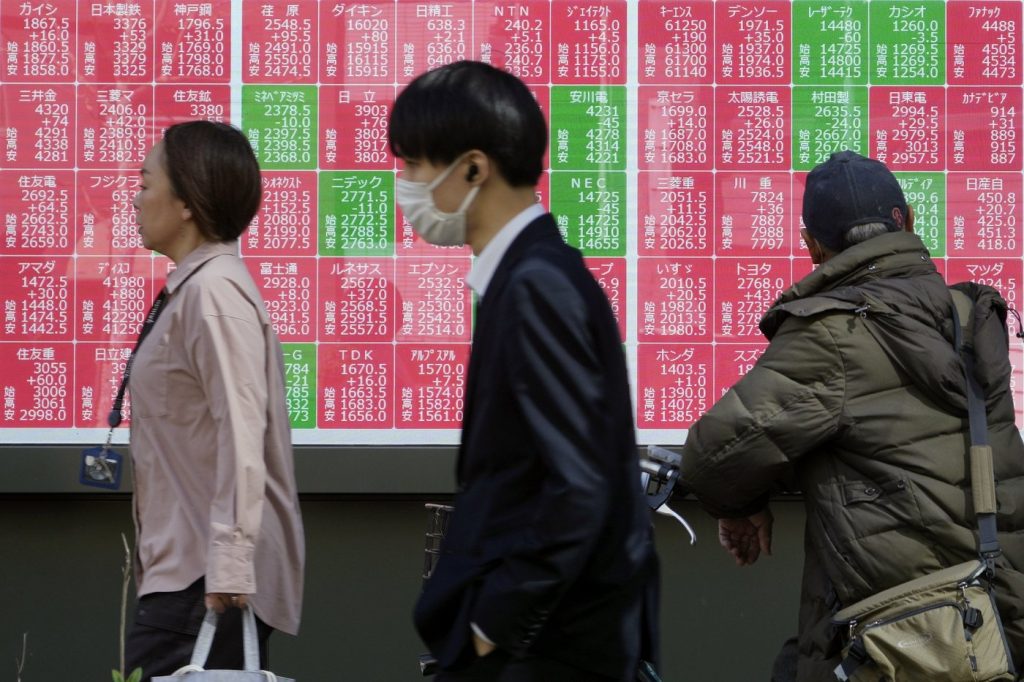BANGKOK (AP) - Asian shares began the week with notable gains, buoyed by a brighter close from Wall Street as February came to an end. Positive factory data from China also helped to lift market sentiment, creating a strong start for trading in March.
In Hong Kong, shares of the Chinese bubble tea chain Mixue Bingcheng surged 40% following its IPO, which raised $444 million. Local reports indicated that the IPO broke records for subscriptions, exceeding 1 trillion Hong Kong dollars (approximately $128 billion). The Hang Seng index in Hong Kong climbed 1.2% to reach 23,222.88, while the Shanghai Composite rose 0.3% to 3,332.27.
Meanwhile, Japan's Nikkei 225 advanced 1.4% to finish at 37,662.14. South Korean markets remained closed due to a holiday, while Australia's S&P/ASX 200 gained 0.6% to close at 8,220.80. In contrast, Taiwan's Taiex index saw a decline of 1.4%, and Thailand's SET index fell 0.7%.
Surveys conducted among Chinese factory managers indicated signs of improvement in February, particularly with a rise in new orders. This uptick was likely influenced by companies striving to expedite their operations ahead of rising tariffs on exports to the United States, where President Donald Trump's administration has escalated import duties on Chinese goods to 20%.
On Wall Street, the S&P 500 experienced a significant rebound, jumping 1.6% to 5,954.50 on Friday. The Dow Jones Industrial Average increased by 1.4% to 43,840.91, while the Nasdaq composite gained 1.6%, closing at 18,847.28. Despite this resurgence, the S&P 500 had experienced declines in five of the previous six trading days, mainly due to weaker-than-expected economic reports and concerns regarding Trump's tariffs, which had knocked the index from its all-time high set the prior week.
The volatility in stocks associated with the artificial intelligence sector was evident, as they have faced sharp declines, and Bitcoin recorded a drop of more than 20% from its peak. Nvidia, however, bounced back with a 4% increase after falling 8.5% on Thursday, playing a significant role in lifting the S&P 500. Early Monday trading saw Bitcoin priced at $92,760, recovering from around $84,000 on Friday.
Market gains followed an economic report detailing both positive and negative aspects. Inflation showed signs of cooling, aligning with economists' forecasts according to the Federal Reserve's preferred metrics, which was perceived as favorable news for the market. This reduction in inflation could allow the central bank more flexibility to continue reducing interest rates later in the year.
Thus far in 2025, the Federal Reserve has held interest rates steady following significant cuts late in 2024, primarily due to concerns over persistent inflation. The economic report also indicated that U.S. households had decreased their spending in January, impacting a critical component of the economy that has been preventing recession amid high interest rates.
Even though inflation remains elevated, it has not reached the peaks witnessed in 2022. There are rising concerns that Trump's tariffs and policies could further exacerbate living costs. Wall Street remains hopeful that Trump's tariff discussions may primarily function as negotiation tactics, which, if reduced, could mitigate potential economic harm.
However, recent data indicates that the mere discussion of tariffs has contributed to consumer anxieties about future inflation, which may influence spending behavior and create additional economic strain, independent of the tariffs themselves. The overall uncertainty surrounding tariffs and regulatory policies could result in a growing distrust in the market if Trump does not lean toward more market-friendly measures, as per a report from Bank of America economists.
In other markets, U.S. benchmark crude oil rose by 42 cents to $70.18 per barrel, whereas Brent crude, the international standard, increased by 43 cents to $73.24. The U.S. dollar fell to 150.46 Japanese yen from 150.72 yen, while the euro rose to $1.0420 from $1.0402.











